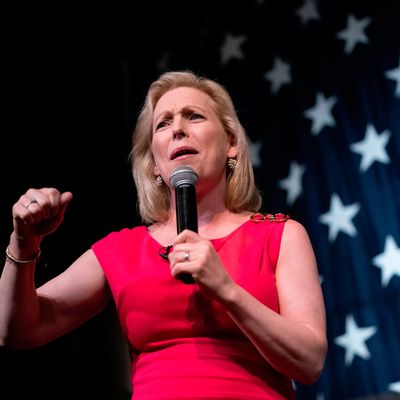
Despite originally high expectations from some observers, New York senator Kirsten Gillibrand withdrew from the 2020 Democratic presidential race today after failing to qualify for the next round of candidate debates in September. Like Tom Steyer, she poured money into early-state ads in hopes of reaching the debate requirement of 2 percent in four qualifying polls. Like Steyer, her efforts were damaged by a dearth of early-state polling in August. But unlike the billionaire, she doesn’t have the resources to keep trucking along in hopes of qualifying for the fourth debates in October; she has largely depleted the carried-over Senate funds that were her campaign’s lifeline.
More generally, Gillibrand just didn’t stand out in the huge Democratic field as she might have hoped to do. A champion of women’s rights and the importance of women’s involvement in politics, she was just one of a historic group of six women running for president this year — three of them (Kamala Harris, Amy Klobuchar, and Elizabeth Warren) Senate colleagues of hers. As a onetime centrist, she might have cast herself as someone radicalized by the Trump administration, the extremism of the GOP, and the suffering so many struggling women and children have endured. Instead, she had to fight claims that she was trimming her ideological sails with the winds. And above all, as the New York Times observed, she was a candidate who just could not buy a break:
A late March rally Ms. Gillibrand planned outside the Trump International Hotel and Tower in New York was blotted out by the media frenzy accompanying the submission of the Mueller report to the Justice Department. An early appearance on Rachel Maddow’s coveted prime-time show was dominated by Ms. Maddow’s biting introduction of Ms. Gillibrand as a candidate who once held conservative positions on gun rights and border control. And by random drawing, Ms. Gillibrand appeared twice on the debate stage beside Mr. Biden and Ms. Harris, whose rivalry consumed both events.
Some political people believe Gillibrand was fatally handicapped by grumbling (particularly among donors) about her leading role in the effort to get Al Franken to resign after a series of sexual-misconduct allegations against him went public. But if she was hurt by too high a profile in that incident (and that is debatable), her too-low profile in a race with too many choices is probably what did her in. It might have done her a world of good to get the kind of debate-breakout opportunity Harris grabbed back in June. But as a white woman without Warren’s celebrity or even Klobuchar’s next-door-neighbor appeal in Iowa, in a field where two men named Joe Biden and Bernie Sanders soaked up an awful lot of support, Gillibrand just never got the oxygen to make her candidacy thrive.
She indicated upon her withdrawal that she intends to endorse a surviving candidate, and perhaps her timing there will be better. She’s also only 52; she won’t be Biden’s age until the 2044 presidential cycle. As a New York senator, she won’t be forgotten and will have plenty of opportunities to gain the media attention this year’s crowded competition denied her. She is in fact the sixth U.S. senator from New York to seek the presidency without success (the list of her predecessors runs from Aaron Burr to Hillary Clinton). She was smart to get out of a hopeless race without humiliation.






























